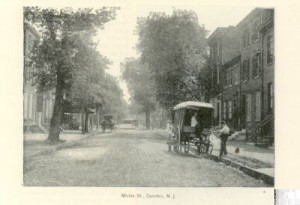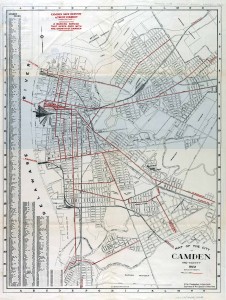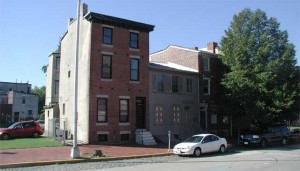While walking to the Whitman house last week, I was struck by how different Camden must have looked during Whitman’s time. Today’s central Camden would be unrecognizable to someone living there in the 19th century.
From Whitman’s time until the 1960s, Mickle Street was a narrow tree-lined street with row houses on both sides. Running parallel to the north were the tracks of the Pennsylvania railroad. A few blocks to the west, the tracks ended at the Delaware River, where a ferry ran to Market Street in Philadelphia. This had to have been a bustling, noisy place in late 19th century at least while the trains and ferries were running. Whitman’s bedroom was not more than 60 feet from the train tracks.
Mickle Street was widened to six lanes in the 1960s. To make room for the expansion, all of the houses on the north side of the street were demolished along with the railroad tracks. It was renamed renamed Martin Luther King Boulevard in the 1990s. A forgotten section by the river is still called Mickle Street.
Camden was a booming industrial city in Whitman’s time, but it has never been glamorous. The 20th century brought dramatic decline to Camden. Today Mickle Street (many people still call it by its old name) is a street of empty lots covered in weeds and trash, with the occasional boarded up, half burnt-out brownstone awaiting demolition. There is little traffic on this six lane street. Only three or four 19th century structures remain.
What would Whitman think of Camden today? He was a complicated man of contradictions so I can’t say. But if he were living in that house today, Whitman would have new neighbors: a prison (that he could see from his bedroom window), a center dedicated to himself (I can safely say he would have loved that), and a Campbell’s Soup factory that I mistook for a prison. He would be living in one of the poorest and most violent cities (per capita) in the United States. His middle class neighbors would have fled long ago to the suburbs. His fancy friends from Philadelphia might think twice before coming to Camden. Whitman’s Camden is long gone. It’s a miracle the house is even standing while its neighborhood has all but vanished. Hopefully the 21st century will be better for Camden.
image source: http://www.dvrbs.com/camden-streets/CamdenNJ-Streets-MickleStreet.htm
Fahim, Kareem. “An inside look at violence in Camden” The New York Times 9 Feb 2008: web
_____
—–




Maybe it’s just me, but I don’t see Whitman having a problem living in modern Camden. We are talking about a man who seemed to be pretty open to minorities having equal rights, so at least by his writing, it would seem that living in an area inhabited mostly by minorities wouldn’t bother him. Also, I think based on his belief that he would leave a mark on the world in his lifetime, he would undergo any discomfort with living in Camden in order to live next to a center dedicated to himself.
However, I wonder if there would be a difference between a Whitman transported through time and a Whitman who simply happened to live in the present. Assuming he lived through the Civil Rights movement, I think he would still show an element of striving for equality in his work. In fact, I think the only difference would be the context of his writing. Perhaps we would be reading “Memories of John F. Kennedy” this week.
I agree with Jewbacca. I can picture him writing the many sides of Camden life, celebrating the beauty that still remains, writing from the persona of the marginalized, and accurately describing the area surrounding him. He write about the beautiful and the ugly with equal energy and detail.
It has been decades since the civil rights riots that caused cities to shed businesses and attract crime and poverty instead. Philadelphia and Camden are only two of the scores of cities that still haven’t recovered–my neighboring Trenton is another.
Whitman lived through his own time to civil upheaval, one more gruesome and scarring than those of the sixties. While the poet believed in the fight for justice and equality, he mourned the emotional scarring and loss of life of the war. I have no doubt that Whitman would understand the fate of his beloved Camden, but the fact that the city remains divided would be something to weigh upon his thoughts.